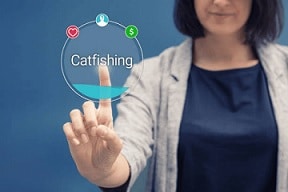Catfishers can use fake identities to steal crucial information and manipulate people. They may request personal information such as passwords and banking details, which can be exploited for financial gain or even to commit cyber-attacks.
It is why it’s important to recognize red flags and protect yourself from online catfishing. Here are a few tips to keep in mind:
Be wary of strangers
When talking with strangers online, it is crucial always to be cautious. If you are feeling suspicious, ask a trusted friend for advice or use a cybersecurity tool to help you spot the warning signs of catfishing.
People catfish for a variety of reasons. They may want to hide their identity to troll others or try to extort money from them. They may also do it for revenge, using a false identity to entice a victim into a fake relationship to humiliate or hurt them emotionally.
Some warning signs of catfishing include a lack of pictures on their profile or only one picture that does not change over time. They may also have few followers or friends on social media. Additionally, if they decline to video chat with you, this is another red flag. A video call can help you verify your identity and prevent being scammed. If they refuse to do a video chat, ask them why and take heed of their answer.
Don’t share personal information
Today, many people have a massive amount of personal information online. Their names, birthdays, photos, occupations, social security numbers, and whether their parents are home are all potentially dangerous information that should not be shared with strangers.
Catfishers use these pieces of information to build a relationship with their victims and gain access to their financial or personal information. For instance, they might create a heart-tugging backstory about childhood trauma to gain their victim’s trust or share a far-fetched story that convinces their target to send money.
If someone you’re talking to online doesn’t have a lot of friends on their social media accounts, refuses to video chat, or makes excuses about why they can’t talk to you, this is a big red flag. You should also check if the person’s profile photo is their actual picture. Having a different name can also indicate that they are not who they say they are. It is an easy step that can save you a lot of grief and pain in the long run.
Don’t send money
Catfishers often prey on people by asking them to send money. They might pretend to be experiencing a medical emergency or need help paying for travel expenses. It is a red flag, especially if they ask for your address or bank information. You should also be suspicious if they refuse to speak on the phone or video chat.
It’s crucial never to send anyone you meet online any money, even if they seem reasonable. It is because these scammers are likely to use this money for nefarious purposes, such as buying personal information that could be used to commit fraud.
The internet is an excellent tool for research, so be sure to use it to validate the information someone shares with you. Doing this can be as simple as looking up a person’s name on social media or doing an image search. If something seems fishy, don’t hesitate to ask questions and get to know the person you are interacting with. It can be significant for young people, who may be more vulnerable to being catfished.
Don’t meet in person
Catfishers often seek money or personal information from their victims. They may ask you to send them nudes or other sensitive material, or they might ask for your passwords to access your accounts. These are red flags to be alerted of and should be reported to the site you are communicating with.
Catfishing can be particularly dangerous for people with social anxiety, who are more likely to fall into these traps. It can also be a common problem among teens desperate to find romantic partners online.
It is usually easy to tell if someone is catfishing you. They may have few friends or followers on the platform they use to communicate with you, and their photos will be low-resolution. In addition, their written English could be better. They may also claim to be from another country or city, or their name might be misspelled. These are red flags that they may not be who they say they are. If you suspect you are being catfished, do a reverse image search on their photos and social media profiles to see if you can find proof of their identity.
Don’t give out passwords
Catfishers can use a person’s details and pictures to create an identity they can use for fraud or other nefarious purposes. They can hack into accounts, access inappropriate content, steal money, and more. That’s why it is so important not to give out passwords to anyone until you can be sure that they are who they say they are.
If someone only has one or two professional photos linked to their online identity, it’s a red flag that they are likely catfishing you. People may catfish for various reasons, including poor self-esteem, a desire to present an idealized version of themselves or a feeling of revenge. Mental health issues such as depression, anxiety, and narcissism can cause people to hide behind a false online persona.
Online dating has come a long way, but it’s crucial to remain cautious when meeting new people. These tips can help you avoid being catfished so that you can enjoy the benefits of digital dating without the risk. Good luck! And don’t always forget to smile.
